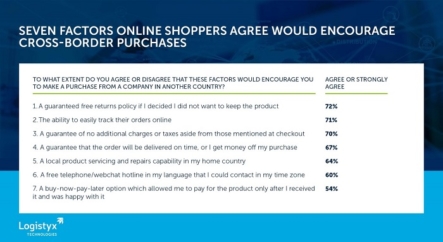-
Nutrivend selects Forterro’s Orderwise to support online expansion and streamline operations - 1 day ago
-
ARROWXL LAUNCHES AMBITIOUS ZERO WASTE ROADMAP - April 8, 2025
-
THE BCMPA’S NEW CAMPAIGN DRIVES OUTSOURCING SUCCESS IN Q1 - April 7, 2025
-
BLACKOUT TECHNOLOGIES TARGETS TELEMATICS-INTEGRATED MOBILE DEVICE BLOCKING TO COMBAT SMARTPHONE DISTRACTION - April 1, 2025
-
OpenADR Alliance announces first OpenADR 3.0 certified products with EVoke Systems, E.ON Energy and Universal Devices - March 25, 2025
-
Growing fulfilment and contract packer appoints new Managing Director - March 25, 2025
-
When is it time to invest in a WMS? Understanding the key trigger points - March 25, 2025
-
eCapital helps Vantage Recruitment on its journey to financial success - March 24, 2025
-
Hugo Beck Celebrates 70 Years of Packaging Innovation with Open House Events - March 20, 2025
-
PROLOG FULFILMENT SUPPORTS LUNA DAILY’S COMMITMENT TO BETTER BODY CARE FOR ALL WOMEN - March 19, 2025
But 66% believe international purchases will arrive later than promised; are more likely to be damaged in transit (47%); and will be more difficult to return (73%)
New research suggests 57% of online shoppers around the world have made at least one online purchase from a company in another country in the last 12 months – while a further 22% have considered doing so. And 43% agree or strongly agree that doing more online shopping in general during the pandemic means they are now more willing to consider cross-border e-commerce purchases, with Clothing and Footwear being the products they are most likely to order.
The survey of 2,035 online shoppers in the US, Germany, Australia, and the UK was commissioned by Logistyx Technologies, the leader in strategic parcel shipping and fulfilment technology. It highlights that Clothing and Footwear is the sector most likely to generate cross-border e-commerce sales, with more than half (56%) of respondents saying they are likely to consider ordering these products from abroad. Next came Sport, Hobbies, Leisure (44%), followed by Health and Beauty (42%), and Consumer Electronics, Computers, Phones (41%).
However, many consumers continue to have a poor opinion of the delivery experience for international e-commerce and are less forgiving if things go wrong. For example, a little more than 59% of online shoppers agree (24% strongly) they are less likely to give a company in another country a second chance if they make a mistake with their order.
Approximately 66% of respondents say they believe cross-border purchases will arrive later than promised, while 47% believe they are more likely to be damaged in transit. Not only do 69% believe delivery charges will be higher for international orders, but 59% believe they will have to pay additional fees or duties which have not been made clear at checkout.
Overall, product returns remain one of the biggest concerns related to cross-border purchases, with 73% believing product returns will be more difficult.
On top of this, online shoppers think it will be more difficult to get help if they need information about their order, with 64% believing it will be harder to contact the company to ask about their order than if buying from a domestic business.
“People are definitely becoming more open to shopping on ecommerce sites based in other countries, which is great news for online retail businesses,” said Geoffrey Finlay, CEO of Logistyx. “But if you want to win and retain international customers, you need to address the key concerns around shipping and delivery highlighted by our research. While you can mitigate some of these issues by implementing the right supply chain systems, you also need to select the right carriers for each country or region both in terms of service level and costs. It’s essential to work with carriers that can provide visibility over the end-to-end parcel delivery journey – ideally in real time, and you should be sure to leverage carrier performance data to identify opportunities to improve processes.”
Asked what factors would encourage them to make an online purchase from a company in another country, top of the list for online shoppers in the research was a guaranteed free returns policy. A large majority (72%) of respondents agree this would encourage them to make an online purchase from a company in another country. Next came the ability to easily track orders online (71%), with up-front transparency about additional charges or taxes for cross-border orders (70%).
“Many of these issues revolve around giving control and clarity to cross-border shoppers,” said Finlay. “Returns appear to be a major pain point. While making them free may not always be feasible given the cost and complexity of international shipping, it’s important to make the process as easy and hassle-free as possible. Be clear about returns policies, provide returns packaging and labels with the original parcel, make booking a return quick and painless, and ensure the refund is initiated as soon as the return is collected from the customer.”
Seven factors online shoppers agree would encourage cross-border purchases
| To what extent do you agree or disagree that these factors would encourage you to make a purchase from a company in another country? | Agree or Strongly Agree |
| A guaranteed free returns policy if I decided I did not want to keep the product | 72% |
| The ability to easily track their orders online | 71% |
| A guarantee of no additional charges or taxes aside from those mentioned at checkout | 70% |
| A guarantee that the order will be delivered on time, or I get money off my purchase | 67% |
| A local product servicing and repairs capability in my home country | 64% |
| A free telephone/webchat hotline in my language that I could contact in my time zone | 60% |
| A buy-now-pay-later option which allowed me to pay for the product only after I received it and was happy with it | 54% |
For more data insights from the survey, download the full report Embracing the Cross-Border E-Commerce Opportunity: https://learn.logistyx.com/cross-border-e-commerce-report

































